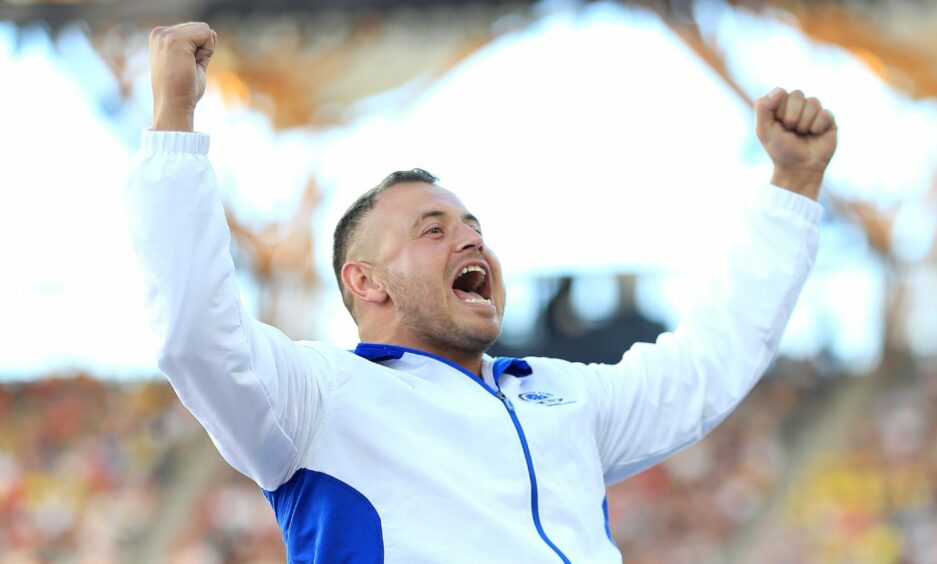It has been a long and hellish journey for Burghead hammer thrower Mark Dry since his last Commonwealth Games medal.
It was only in January that Dry was allowed to set foot in a hammer cage competitively again, after having served a 28-month ban for misleading anti-doping officers.
Dry said the mistake arose from the sheer panic of missing a test in October 2018 where, instead of telling the authorities he was in Scotland visiting his family, told them he was on a fishing trip.
It was not the lie alone, however, that resulted in the ban. Dry’s mistake was in fact admitting that he had lied. Had he said nothing, UKAD would simply, as a matter of procedure, have recorded a missed test. For Dry, the combination of errors resulted in a maddening 28 months which cost him the best years of his career.
Since then, however, it is that sense of injustice that has kept the fire burning for the Burghead thrower. The Scottish record holder, who has never failed a drugs test, was back in the hammer circle only four months ago, just days after the ban had lapsed. Two weeks later, he surpassed the Commonwealth Games standard, and has given himself a fighting chance of winning his third consecutive medal at the competition, should he be selected.
If the disproportionate nature of Dry’s ban is hard to fathom, so too is his ability to throw 70 metres after four years without competing. Since the ban, Dry has cleared houses, worked as a scaffolder, installed kitchens, and built roofs, earning his keep whilst he has been unable to compete. The proceeds of his work went towards funding a legal battle to clear his name, which ultimately ended in failure and a £20,000 bill.
Clear of conscience, however, Dry will return to international representation this weekend when he competes for Scotland at the Loughborough International. Many thought he would never compete again – yet for Dry, it was never in any doubt.
He said: “It wasn’t hope – I knew I would (compete again). I’d make it happen because I just cannot stand my situation and other people’s situations in sport and how they’ve been treated.
“It wasn’t me hoping I would get back, I just knew I would do anything in my power to get back here. And if I was injured, and that meant I couldn’t make it this year, I would have to go for another year and do whatever it took to get back in that vest. I just knew I would get back in a vest.”
Dry has retained almost universal support amongst fellow athletes, with Zoey Clark speaking out in his defence after Salwa Eid-Nasser, the world 400m champion, avoided a ban despite missing three consecutive drugs test in the run-up to Doha 2019. Not that Dry has many to thank for his return to competition – indeed, his ability to bounce back has come through sheer graft.
“Bills need to be paid,” he said. “I need to eat and survive, and I’m not shy to hard work. It’s not a problem (working physical jobs). It’s not conducive to effective training, but I’ve always been good on the tools and was a landscaper when I was younger.
“I’ve been a full-time scaffolder for a good while now. I’m a general contractor doing various things on the tools, installing kitchens, doing renovations, building roofs – just general renovation work laying floors and fixing issues. I’m just a general tradesman, basically.”
Despite balancing physical toil by day and training by night, Dry will use the same attributes that have seen him bounce back into international action when he steps inside the throwing circle on Sunday.
“I didn’t quit. I’ve come back. I’ve fought against everything. My Scotland vest at Loughborough is a massive mental and emotional boost for me. To make the Commonwealth Games would be really special, because it’s a really special team. It’s held a very strong place in my heart through my career. It’s the highlight of everything I’ve done, representing Scotland at the Commonwealths.
“Making the Commonwealth team is definitely the most important thing,” he reiterated. “I’ve already come back and qualified and thrown over 70 metres again. If I don’t get selected because better people get selected, I’ll be disappointed, but I will know I’ve worked as hard as I can to get it done.”
For most athletes, a 28-month competition ban would be career ending. But Dry’s determination to prove people wrong has outweighed the emotionally devastating nature of the sanction.
“The fire’s been burning very strongly – there have been doubts, and there’s been plenty of time when I’ve not wanted to do it or carry on, and I’ve asked myself ‘am I just doing this to be stubborn?’ I probably am, but it is what it is – it’s kept me in the game and it’s kept me motivated.”
Whatever happens when Dry pulls on the Scotland vest on Sunday, don’t expect him to walk away from athletics any time soon.


Conversation